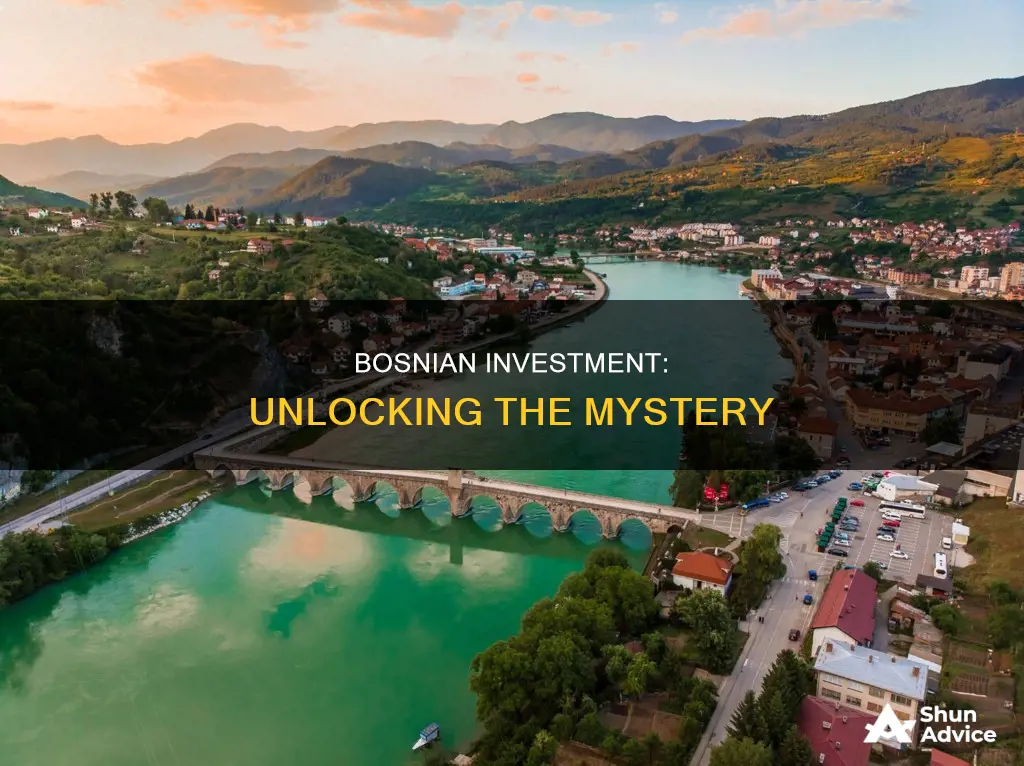
Bosnia and Herzegovina has struggled to attract investment since its independence from Yugoslavia in 1992. The country's economy is still recovering from the Bosnian War, which caused over €200 billion in material damages and saw GDP (excluding services) reduced by 90% between 1990 and 1995.
Bosnia and Herzegovina faces several challenges that deter potential investors. Firstly, the country has a high unemployment rate and a complex bureaucracy system that can make it difficult for businesses to operate. The country also has a history of communist-era policies that discourage business activity and investment. Additionally, interviews with businessmen in BiH have revealed concerns over the banking system, high tax rates, and excessive official corruption.
However, there are also positive signs for potential investment in Bosnia and Herzegovina. The country has a growing talent pool of young, highly skilled, multi-lingual professionals that can attract foreign investors, particularly in the Business Process Outsourcing (BPO) sector. The country also has a favorable tax system, with one of the lowest VAT rates in the region and competitive corporate tax rates. Additionally, Bosnia and Herzegovina has a stable currency and is in a strategic geographical location that provides access to a large consumer market.
Overall, while Bosnia and Herzegovina faces several challenges, there are also opportunities for investment, particularly in sectors such as outsourcing, tourism, agriculture, and manufacturing.
What You'll Learn

Poor economic and political structures
Bosnia and Herzegovina's economy is a work in progress, with the country transitioning from socialism to capitalism. However, the current economic and political structures in the country are maintaining the failed communist-era policies that contributed to the economic downturn and eventual break-up of Yugoslavia. These policies discourage business activity and investment.
The country's economy is dominated by services, which accounted for 55% of gross domestic product (GDP) in 2016, with a moderately developed industrial and manufacturing sector (23% and 12%, respectively), and a limited agricultural base (about 6% of GDP). The country's economy is also heavily reliant on energy, with artificially low prices providing a disincentive to make savings.
Bosnia and Herzegovina has a complex political structure, with a fragmented internal market, which has negative implications for investment and doing business. The country is divided into two entities: the Federation of Bosnia and Herzegovina and Republika Srpska, each with its own constitution, president, government and parliaments. This complex system of governance helps maintain institutional balance between communities but, without adequate coordination, creates scope for significant inefficiencies.
The country's economy is also burdened by a large public sector, with the government spending over 12% of GDP on public-sector wages in 2013. Employment in the public sector, including government administration and state-owned enterprises, entails significant benefits, such as higher wages, which are rare in the private sector. As a result, the public sector has been significantly more attractive than the private sector, which acts as a drag on private-sector development.
Bosnia and Herzegovina's economy is also burdened by a large and inefficient state-owned enterprise (SOE) sector, which creates unfair competition for private enterprises. SOEs dominate the infrastructure-related sectors (transport, energy, and utilities), but due to their weak governance, inefficient operations, excessive employment, lack of cost-reflective pricing of services, and high indebtedness, they are unable to finance the necessary investments needed to maintain and upgrade the relevant infrastructure.
The country's SOE sector is also burdened by opaque ownership and insufficient oversight, which create space for mismanagement practices, including the hiring of personnel based on personal networking instead of skills or on political motivations. SOEs have significant advantages compared to the private sector. Roughly half receive direct budgetary support or indirect support through tax exemptions in light of their financial difficulties. Most SOEs do not pay any dividends, and SOE salaries are, on average, 40% higher than in the private sector, despite lower labour productivity and lower profitability. The higher salaries and more stable employment conditions put unwarranted wage pressures on the private sector and negatively affect its ability to attract talent.
Bosnia and Herzegovina's economy is also affected by a lengthy and complicated process for obtaining licenses and permits, which is a significant hindrance to foreign investment. The country's judiciary is also inefficient and lacks proper planning and accountability processes.
Beanie Babies: A Collectible Craze
You may want to see also

Negative experiences of foreign investors
Bosnia and Herzegovina is open to foreign investment, but there have been some negative experiences for foreign investors in the country. The country's complex legal and regulatory frameworks, government structures, non-transparent business procedures, and weak judicial system make it difficult for foreign investors to navigate the business landscape.
Some specific challenges that foreign investors have faced in Bosnia include:
- High costs of employing workers, including wages, taxes, and social security, which can absorb up to two-thirds of the value an average worker produces.
- A complex and burdensome process for establishing a business, with numerous procedures and lengthy timelines.
- A weak judicial system that is susceptible to the influence of ethno-nationalist parties and their patronage networks, making dispute resolution challenging.
- Endemic corruption, including in the business registration and licensing process, which increases costs and risks for doing business.
- Lack of political will to implement reforms that would improve the business climate, such as streamlining the legal and regulatory framework and addressing corruption.
- Complex institutional and territorial structures that create inconsistencies and redundancies in laws and regulations, making it difficult for investors to understand their obligations.
- Lack of protection for intellectual property rights, with weak enforcement of IPR laws and low awareness among local businesses.
- High unemployment and a shrinking workforce, with many skilled workers emigrating to other countries.
- Restrictive labour laws and high mandatory contributions on labour, which discourages employment and increases incentives for unregistered employment.
These challenges have led to a lack of positive experiences for foreign investors in Bosnia and Herzegovina, impacting the country's ability to attract foreign direct investment.
Human Capital: The Investment in People
You may want to see also

High employment costs
In addition to employment costs, investors must also consider interest payments and informal payments to access basic business services like electricity. Over one in 10 businesses in BiH reported giving bribes in 2011, and a 2014 Gallup poll found that 91% of people in BiH believe corruption in the government is widespread, the second-worst score in the world.
To address high employment costs and encourage investment, BiH needs to reduce barriers to entry and ease the business environment. Implementing policies that lower employment costs would reduce the protection of incumbent firms and help generate investment, creating sustainable employment and a thriving economy.
Quantum Computers: The Next Investment Boom
You may want to see also

Poor business climate
Bosnia and Herzegovina (BiH) has the worst business climate of all the former Yugoslav republics, according to international rankings. The country's economy is a transitional, upper-middle-income economy, and while it has made progress since the mid-1990s, it still faces acute social and economic challenges.
Economic reforms to complete the transition from a socialist past to a market-oriented future have been slow, and the country has a low level of foreign direct investment (FDI). In the World Bank's 2020 Ease of Doing Business Report, BiH was ranked 90th out of 190 global economies, with the report highlighting the lengthy and arduous processes involved in starting a new business and obtaining construction permits.
The complex institutional and territorial structure of BiH complicates the economic landscape and may further deter foreign investment. The country's economic landscape is influenced by its three major, mutually reinforcing imbalances:
Large Public Sector and Limited Private Wealth Creation
The public sector in BiH is disproportionately large, dating back to Yugoslav times, and has only been partially reformed. Public expenditures amount to nearly half of GDP, and if state-owned enterprises (SOEs) and corruption costs are included, the public sector may account for up to 70% of GDP. High social protection spending benefits the wealthy and creates a negative spiral of high taxes and biased employment. The large tax wedge swallows over a third of even the lowest-paid workers' salaries, making it challenging for employers to create formal jobs.
Economy Based on Consumption Rather Than Production
During the post-war economic recovery, BiH relied heavily on financial inflows, aid, and remittances, which fuelled consumption-based economic growth. Today, consumption remains high, at over 100% of GDP, and the country needs to shift towards an economic model focused on producing goods and services to achieve long-term sustainable growth.
Under-performing Export Sector
Exports account for only 30% of GDP, one of the lowest rates in Europe, indicating BiH's weak competitiveness. This is partly due to the poor business climate, high employment costs, and poor transport connections. Achieving higher export levels would require firms that can compete internationally, and creating such firms demands a more conducive business environment.
While Bosnia and Herzegovina has made some economic progress, the business climate remains challenging. High employment costs, complex regulations, bureaucratic inefficiencies, and corruption continue to hinder foreign investment. However, there are also opportunities for improvement, particularly in sectors such as tourism, wine, light manufacturing, IT, and agri-processing.
Marijuana Investing: Overcoming Investor Fear
You may want to see also

Lack of economic reform
Bosnia and Herzegovina's economy has been described as the worst business climate of all the former Yugoslav republics. The country has struggled to transition from communism to capitalism, with the current economic and political structures maintaining failed communist-era policies that contributed to the former Yugoslavia's economic downturn and eventual break-up. These policies discourage business activity and investment.
The country's economy is dominated by services, which accounted for 55% of gross domestic product (GDP) in 2016, with a moderately developed industrial and manufacturing sector (23% and 12%, respectively), and a limited agricultural base (about 6% of GDP). The country has a sizable current account deficit and a very high unemployment rate, which remain its two most serious economic problems.
Bosnia and Herzegovina's economic model is imbalanced, with public policies and incentives skewed toward the public rather than the private sector, consumption rather than investment, and imports rather than exports. The country needs to shift to a business environment conducive to private investment that supports small and medium-sized enterprises, facilitates exports, and generates much-needed private-sector employment.
While the country has made some progress in economic reform since the end of the war, implementation has been slow. For example, the privatisation of many companies (mainly factories) has faced massive problems, causing owners to reduce or deny workers their salaries. Additionally, the country has struggled with political corruption, a complicated bureaucracy system, and a lack of good e-governance structures, all of which create a volatile and insecure business environment that hinders foreign investment.
To address these challenges, Bosnia and Herzegovina needs to take decisive steps to make the public sector more efficient and unleash the growth and job-creating potential of the private sector. This includes improving the legal environment for businesses, rationalising tax policies, creating a viable commercial banking system, removing barriers to inter-entity trade, and accelerating privatisation.
Young Investors: Emulate Warren Buffett's Strategy
You may want to see also







